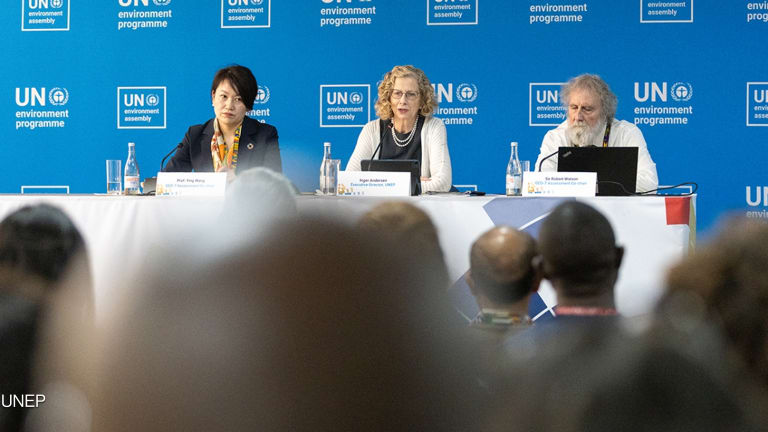
Agan Soyan Hassan and her six children lost everything, including their home and livestock as flood waters engulfed their village of Ranranle in south-east Ethiopia. Wading through water for four grueling hours, they reached higher ground with a mere plastic sheet for shelter. To feed her family, Hassan and her children had to depend on relatives and neighbors for their survival.
This family is not the only one to have suffered such a fate. Climate variability and extremes are pushing millions of people into severe food insecurity.
“Two degrees of temperature rise could push an additional 189 million people into food insecurity. Four degrees warmer could increase that number to 1.8 billion.”
— Amir Mahmoud Abdulla, deputy executive director, World Food ProgrammeThis year, the world has again watched extreme weather tear apart communities across the globe. These impacts used to be viewed as a threat to future generations. No longer. Climate change is super-charging droughts, heat waves, floods, and wildfires that are destroying lives, property, and livelihoods. Crucially for those of us working in development and humanitarian aid, climate change is piling stresses on small-scale agriculture, serving to exacerbate hunger around the world.
The latest report on the global state of food security finds that hunger is on the rise, with the number of undernourished people increasing to nearly 821 million in 2017, returning to levels from a decade ago. Alongside conflict and economic slowdown, the report attributes this rise to extreme climate events.
The frequency of these events has been rising and will continue to do so as global warming continues. The number of extreme weather events has more than doubled since the early 1990s, with an average of 213 occurring each year in the past decade.
Those most vulnerable to climate-related hazards are the world’s 2.5 billion small-scale farmers, herders, fishers, and forest-dependent communities. They often lack the resources to rebound from extreme events that can cause a total loss of livelihood assets, while also facing more insidious challenges: gradually changing and more erratic weather patterns that reduce crop yields, increase the risk of harvest failure and food price swings, and make it more difficult for people to meet their food needs for the entire year.
Each degree of warming matters. In October, the Intergovernmental Panel on Climate Change released its landmark report on the impacts of 1.5 degree Celsius of warming, as opposed to the 2 degree Celsius limit that forms the basis of the Paris climate agreement.
It is unequivocal. The IPCC report finds that “overall, food security is expected to be reduced at 2˚C of global warming compared to 1.5˚C, owing to projected impacts of climate change and extreme weather on yields, crop nutrient content, livestock, fisheries and aquaculture and land use.” Harvests of maize and wheat will be lower with temperature increases between 1 degree Celsius and 2 degrees Celsius, as well. For example, global maize production is projected to fall by 10 percent with a warming of 1.5 degrees Celsius, and 15 percent with a warming of 2.0 degrees Celsius above pre-industrial averages. Two degrees of temperature rise could push an additional 189 million people into food insecurity. Four degrees warmer could increase that number to 1.8 billion.
As humanitarians, our efforts need to focus on the protection of the most vulnerable. Even if we were to stop producing greenhouse gas emissions tomorrow, the inertia in the climate system guarantees that we remain burdened with decades of negative impacts. We need to help governments and vulnerable communities prepare for less predictable weather and more frequent extreme events while strengthening the resilience of those most at risk.
“We need to capitalize on our skills in risk monitoring and early warning to act before people are plunged into a food crisis.”
—In parallel to strengthening our ability to absorb unavoidable shocks through humanitarian assistance, we need to capitalize on our skills in risk monitoring and early warning to act before people are plunged into a food crisis. We can provide information to governments, farmers and vulnerable communities that allow them to plan ahead, reduce crop losses and use a better understanding of the climate system to inform policies, planning and investment decisions. Building on this, we can ensure that complementary structures and mechanisms are available to cover the most catastrophic risks — such as weather-index insurance, forecast-based financing, and shock-responsive social protection systems.
Climate change will, without a doubt, continue to place additional pressures on global food security and development. We can and must apply our humanitarian principles, skill sets, and experience to protect the world’s most vulnerable from its impacts. What humanitarian actors require on this journey are predictable, long-term investments that can accompany our humanitarian programs with a complementary effort in risk reduction, risk transfer, and forecast-based early action. Without such a twin-track approach, there is little chance that the world can achieve zero hunger by 2030.
Echoing the words of Sir David Attenborough from his recent address at COP24, we are facing “our greatest threat in thousands of years.” Climate change is no longer a vague future concern. For many communities from the Americas to Africa to Asia, it is already a grim reality.








